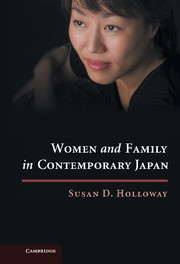Book contents
- Frontmatter
- Contents
- Preface
- PART I
- PART II
- PART III
- PART IV
- 7 Shitsuke: The Art of Child Rearing
- 8 Maternal Involvement in Children's Schooling
- 9 Balancing Work and Family Life
- 10 Women and Family Life: Ideology, Experience, and Agency
- References
- Appendix A Berkeley Parenting Self-Efficacy Scale (Preschool Version)
- Appendix B Research Methods
- Index
10 - Women and Family Life: Ideology, Experience, and Agency
Published online by Cambridge University Press: 05 June 2012
- Frontmatter
- Contents
- Preface
- PART I
- PART II
- PART III
- PART IV
- 7 Shitsuke: The Art of Child Rearing
- 8 Maternal Involvement in Children's Schooling
- 9 Balancing Work and Family Life
- 10 Women and Family Life: Ideology, Experience, and Agency
- References
- Appendix A Berkeley Parenting Self-Efficacy Scale (Preschool Version)
- Appendix B Research Methods
- Index
Summary
As the preservers of home life, our women are still held subject to the old family traditions, while modern capitalism, on its invasion into our country, has ruthlessly taken advantage of their cheap labor and patient and inexhaustible industry.
(Mishima, 1941, p. 232)In her memoir, writer Sumie Seo Mishima calls attention to changes in women's lives during the first three decades of the twentieth century, when the new economic and political forces of the modernizing society were transforming traditional family structures and cultural patterns. Remarkably, Mishima's observations also ring true in today's Japan: women continue to fulfill a cultural mandate to take on nearly all the domestic responsibilities for their families and corporate interests continue to expect women to fill in as cheap part-time workers at their beck and call. And yet, we can also detect significant changes in women's lives, beginning with a simple demographic fact: women are increasingly postponing marriage and parenthood, and limiting their family to one or two children. Many dream, too, about having professional careers, although their plans are frequently derailed by a combination of domestic pressures and workplace exigencies.
The story of Japan's rapid transformation from an isolated federation of fiefdoms to a modern industrialized democracy is nothing short of extraordinary. An essential aspect of this transformation was the government's manipulation of family structure and family practices to create an allegiance to the modern state and to harness the energy and competencies of women.
- Type
- Chapter
- Information
- Women and Family in Contemporary Japan , pp. 196 - 216Publisher: Cambridge University PressPrint publication year: 2010



